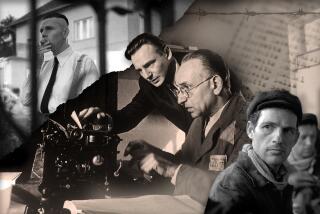William Basch dies at 82; Holocaust survivor was featured in documentary âThe Last Daysâ
William âBillâ Basch, a retired Los Angeles garment industry executive who was one of the Holocaust survivors whose stories were told in the Oscar-winning documentary âThe Last Days,â has died. He was 82.
Basch died of age-related causes Monday at his home in Marina del Rey, said his grandson, Max Basch.
A survivor of the Buchenwald and Dachau concentration camps in Germany who had helped save Jews while working in the underground resistance movement in Budapest, Hungary, Basch arrived in the United States penniless in 1947 and launched a successful high-end womenâs apparel manufacturing business, Basch Fashions, in 1971.
He was one of five Holocaust survivors living in the United States whowere profiled in âThe Last Days.â
The haunting, 1998 feature-length documentary, executive-produced by Steven Spielberg, chronicles the final days of the Jews of Hungary as they were rounded up by the Nazis in 1944 and sent to concentration camps.
âWe lost a great man in Bill,â said James Moll, the filmâs director. âWhen I think of Bill, I think of his bravery. He risked his life to help save other people.â
In appearing in the documentary, in which the five survivors told their own stories, Basch traveled with his son, Martin, to Budapest and Dachau.
âThere are times when I wondered, âWhy was I saved and so many people died?â â Basch said in an interview with the BPI Entertainment News Wire in 1999. âEventually, I came to the realization that there must be a purpose. And one of the purposes is to tell the story while I am alive and able to.â
One of five children, he was born June 4, 1927, in Sasovo, a village in the Carpathian Mountains in what is now Ukraine.
In 1942, after failing to obtain American visas, Baschâs store-owner father sent his three sons to different cities to increase their chances of survival.
The 15-year-old Basch moved to Budapest, where he soon joined the underground resistance movement.
After Germany invaded Hungary in March 1944 and a massive roundup of Hungarian Jews began, Basch joined the network of people working for Raoul Wallenberg, the Swedish diplomat sent to Budapest to lead a desperate effort to save as many Jews as possible.
To avoid Nazi and Hungarian militia checkpoints, Basch used the cityâs sewer system to deliver fabricated documents that conferred Swedish diplomatic protection to the bearer.
One day, instead of surfacing from a manhole in the courtyard of a safe house, he mistakenly surfaced outside the courtyard and encountered two Hungarian fascist militiamen.
As he ran, he blended into a group of people. But it turned out they were being marched to deportation trains bound for Buchenwald.
During the train ride, Basch and others made two failed attempts to escape through a small window in the car. Those who made it outside were immediately killed.
In the documentary, Basch recalled making a pact with two other young men in the concentration camp to stick by one another. When one fell during a forced march and was about to be shot by a guard, Basch and the other boy stood in the way, withdrawing only when the guard threatened to shoot them too.
Revisiting and reliving his wartime past for the documentary took an emotional toll on Basch.
âI was a very sad man for a couple of months when it was over,â he said in the 1999 interview. âBut it is gratifying to know that the documentary will live on past my lifetime.â
After settling in Los Angeles after the war, Basch married the former Rose âHollyâ Branberger, a fellow concentration camp survivor with whom he had three children.
Baschâs mother and one of his sisters were killed in Auschwitz; he never discovered the fate of his father or one of his brothers, said his grandson.
After retiring in the mid-1980s, Basch devoted a good portion of his time to talking to elementary and middle school students -- talks in which he stressed the importance of tolerance.
âIn order to survive, we must accept the responsibility of being our brothersâ and sistersâ keeper,â he once said. âEach one of us must do our share of improving our society one day at a time. We all have the ability to defeat evil in our own way.â
In 2003, Basch received the Wallenberg Medal from the University of Michigan in honor of his heroic and humanitarian actions in Budapest.
âItâs difficult to imagine someone who was 16 or 17 at the time, who had been separated from his family and thrown into this city of Budapest, which was dissolving in blood and fire, and who had the great personal strength to realize what he had to do at that age and to do it,â said John Godfrey, chairman of the Wallenberg Endowmentâs Executive Committee.
âEven as an older man, he had all the talents you could see in someone who as a young man was clever, resourceful, fearless and cheerful,â Godfrey said.
In addition to his children, Esther Katzman, Martin Basch and Nannette Basch, Basch is survived by a brother, Ted Basch; a sister, Edith Tyler; and five grandchildren.
A funeral will be held at 11 a.m. today at Mount Sinai Memorial Parks and Mortuary, 5950 Forest Lawn Drive, Los Angeles.
More to Read
Start your day right
Sign up for Essential California for the L.A. Times biggest news, features and recommendations in your inbox six days a week.
You may occasionally receive promotional content from the Los Angeles Times.






